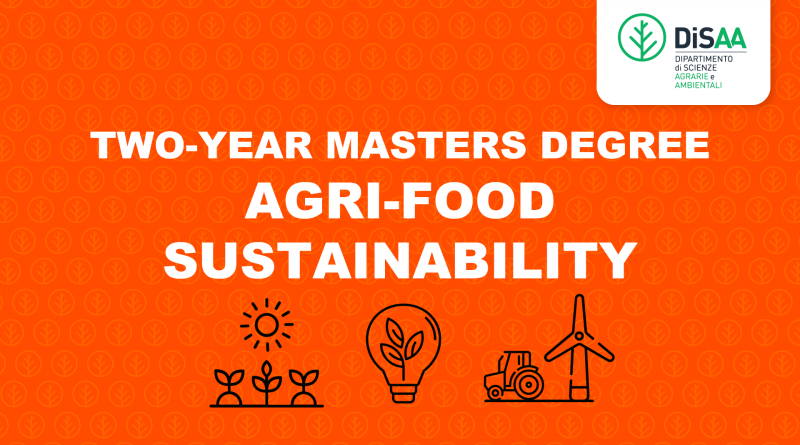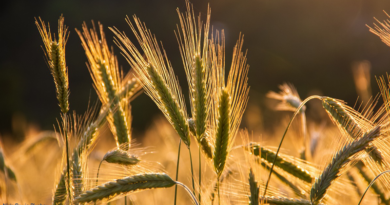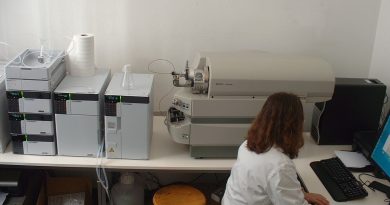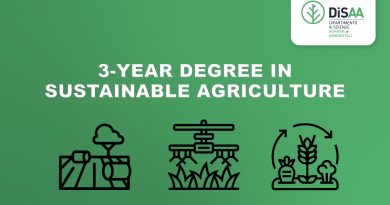TWO-YEAR MASTERS DEGREE IN AGRI-FOOD SUSTAINABILITY
The two-year degree in AGRI-FOOD SUSTAINABILITY studies the most advanced scientific and technical knowledge and technological innovations applied to the various production contexts of agriculture, with the aim of achieving high levels of yield, quality and safety of plant and animal products, ensuring maximum protection and renewability of the natural resources used, in accordance with production and environmental sustainability approaches.
Studying agricultural sciences today means working on the latest findings of scientific research in many fields of agricultural interests that affect different fields including the technological and agronomic, the precision livestock, engineering, modelling, management, etc.
The course offers a multidisciplinary and multifunctional preparation that is essential for designing and managing solutions to the various problems arised by modern agricultural production processes. In particular, the students will focus on the existing links between markets and agri-food sectors, legislative and regulatory requirements, the provision of innovative services and the provision of technical resources adapted to the very high quality and safety standards currently required to agricultural products. This knowledge is extremely demanding whitin the current job market with the overall objective to constantly increase the sustainability of production processes.
TRAINING OBJECTIVES
The degree course aims to train the professional figures that design and manage the processes of an agricultural holding or who support it by providing specialist assistance as expert in technological innovation, technical production facilities, equipment, machinery and installations, or as management, design or administrative consultants.
The training approach is transversal. However, in order to adapt and make our bachelor’s degree more recognisable, we have designed 3 specialisations that further qualify students’ skills on 3 concrete professional areas of primary importance for the national and international labour market:
- A technical management curricula focused on the skills that enable the management and management of production processes in its most diverse fields — technical, economic and regulatory, and a cross-cutting preparation on the interlinkages between business activities and the agri-food distribution or processing sectors.
- Livestock curricula focused on precision husbandry and farming techniques and processes especially linked to the quality, safety, sustainability of livestock production and animal welfare aspects.
- Precision Agriculture curricula focusing on methods and technologies for optimised management of production routes, in order to maximise the efficiency and sustainability of production processes through the use of modelling, information technology, sensorism, machine and plant automation, digital farming.
The entire course will involve two years of study.
The first year is composed of six characterising lessons (analysis of data — agricultural and management policy — sustainable cropping systems — sustainable animal husbandry — mechanisation and advanced technologies for agriculture — farm irrigation systems). The second year begins with the specialisation courses that characterise each of the courses listed above, five in total, plus one free choice option.
Teaching methods significantly differs from those of the three-year degree course. Thanks to previous acquired disciplinary knowledge, lessons are much more interactive and they often work on a project with multi-disciplinary case studies which involve the integration of more lessons’ subjects.
PROFESSIONAL OUTLETS
Studying Agricultural Sciences also means to have an extraordinary set of professional opportunities, as demonstrated by our graduates who, within 12 months of their graduation, have highly satisfied occupations. Our graduates embody the profile of modern agronomist, a professional figure who has a strong technical culture, necessary for the management, management of today’s production processes and related assistance, service and advisory activities.
In this way, our graduates are in a wide range of professions: from the managing bodies to the management of individual farms, from the use in various sectors of the agri-food distribution and processing sectors to companies producing technology and technical resources, to advisory and technical support services, to research and development or to NGOs. A significant proportion of graduates also pursue the liberal profession after sitting the state examination and enter the order of Agronomi Doctors.
TECHNICAL/ADMINISTRATIVE INFORMATION
All persons who obtain the three-year qualification by 31 December 2022 shall be eligible.
However, the application for registration must be submitted by 31 October 2022 at the latest.
Three year graduates from the agricultural degree classes, and a number of other graduation classes who have obtained some credits relating to the characteristic subjects, are automatically admitted. For other three-year routes, additional credits may be requested.
A knowledge of the English language at European level B2 is also required.
Additional information here: https://www.unimi.it/en/education/agricultural-sciences-sustainability




